‘“No disco,” I said. ‘They can make us work together, but I am not listening to disco.”’
Ever since I picked up Dan Stout’s debut novel Titanshade, the first book in The Carter Archives series, I was swept up in its gritty, ‘70s-inspired noir atmosphere, its genuine protagonist and fascinating world. Personally, I love detective novels, film noir, a great mystery, something that sinks its hooks into me and sends my mind reeling with clues, suspects, red herrings and brutal truths. But Dan Stout marries the noir vibe so perfectly with an original fantastical world, that The Carter Archives quickly became one of my all-time favorite series.
Tearing through Titanshade, I was ready for more. Its sequel, Titan’s Day, elevated the atmosphere, setting, characters and the stakes of the city of Titanshade’s criminal activity. Not long after that, the third book in the series, Titan Song, was released, and I jumped on it as fast as I could. The bar was once again raised, bringing a whole new level of quality to an already fantastic series. Rife with strange races, relatable characters, a blue-collar city that feels rich and alive, as well as gripping mysteries and action blended with the realistic banalities of police life, I can’t recommend The Carter Archives enough. I’ll be screaming this from the chilly rooftops of Titanshade as much as I can—but for now, let me tell you more about what exactly makes this series worth reading.
The Worldbuilding, Races & Lore
I’m a sucker for good worldbuilding, and The Carter Archives is rich with a convincing history (both for the city of Titanshade and the surrounding continent), interesting races and captivating lore and religion underlying the whole series. The series’ lead Detective Carter sees his hometown of Titanshade from the perspective of an insider, relishing in its complexities and nuances. For instance, when he walks through the geothermal heat vents in doorways, he says a simple prayer of thanks to the titan (a religious symbol of sorts) who warms the city from beneath. His partner Ajax, on the other hand, is an outsider, experiencing the city with fresh eyes—this means he notices (and misses) things that Carter doesn’t. Ajax is also from a race called Mollenkampi, intimidating, insectoid/reptilian-esque beings with sharp tusks, two mouths and mandibles. It’s terrifying shit, gross even, especially when the Mollenkampi eat (can you guess what that’s like with two mouths?). But within this world full of oddities, the strangeness of the Mollenkampi race—or the frog-like Squibs, the finned, web-fingered, whale-like Gillmyn, the hulking, hairy, multi-armed Barekusu, akin to herd animals—it doesn’t feel out of place.
That’s because each book in The Carter Archives does a phenomenal job of incorporating the strange and infusing into familiar aspects of our own world. Yes, these races are wild and imaginative, but in the context of Titanshade as a city and Carter as a character, it all makes sense. The lore fits in naturally too, as these races have a unified creation myth (the Barekusu came first, as a sort of nomadic shepherd race), and many races in this world follow the One Path, believing in a philosophy of the spirit walking an infinite path. But for Titanshaders, the literal geography and foundation of the city is built upon tall tales of a titan chained and buried beneath a massive mound—his body provides the geothermal warmth that fuels the city’s habitability. This is deeply-integrated stuff, and Stout handles it with thoughtful care.
The Characters & Relationships
As much as the worldbuilding in The Carter Archives is excellent, the characters are its bread and butter. Detective Carter was tough to love at first, but he is a genuinely good person—an average guy with a good heart. Like a bitter beer, the first sip has a tart bite, but each consecutive sip brings more complexity. What’s more, Carter acts as the centerpiece to a complex tapestry of characters from all strata of Titanshade’s class structure. There’s his developing partnership with Ajax, evocative of different policing styles and racial differences, or his special bond with Talena, the daughter of Carter’s past love, and the complications stemming from his attempts at being a father figure. (Talena is also very community driven and has a vastly different perspective than Carter.) There’s also the tug-and-pull of his “will they, won’t they?” relationship with the upper class, politically-connected Gellica, whose mother, Ambassador Paulus, is an ambitious, aggressive magic user whose political aims are relentless.
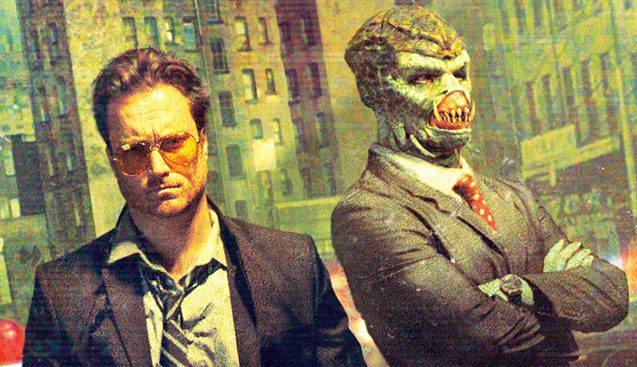
But two of my favorite relationships are the ones between Carter and Gellica, as well as him and Divination Officer Guyer. The former is romantic, the latter a tough love, work-style relationship, but both play a trust game that continuously reveals more about Carter’s character. He, someone who has trouble trusting, is given countless opportunities to place trust in Gellica and Guyer, or even Ajax and Talena for that matter, but he often finds himself at odds. The inner workings of his investigations, moral quandaries and personal insecurities tend to push him in directions that result in bad calls, small betrayals and mistrust. These hurdles feel human, as we are a species predicated on mistakes and skepticism. For the better though, Carter learns from his mistakes, learning to trust in the process too. With him at the center, the tapestry of Titanshade’s denizens feels richer and the relationships are given ample time to develop over the course of the series.
The Setting, Atmosphere & Aesthetic
Adding even more depth to the fantastic characters, the world they inhabit is so distinct and acts as an honest reflection of them. Carter is gruff and often off-putting, but he is also charming and full of soul. There are aspects of Titanshade that reflect him, but it reflects all the other characters too. Each of them experience Titanshade in their own way, and it bounces that experience back. The outcome of that is a melting pot of a city that is utterly brimming with atmosphere: a blue-collar authenticity trickles through its concrete and brick streets; neighborhoods are divided socioeconomically based on access to geothermal heating; the city spreads from industrial, rundown areas full of drug addicts to wealthy sectors peppered with mansions; and the ground floors of buildings are coveted because heat rises from the bottom.
Cementing the authenticity are a plethora of shops, bars, restaurants, districts and more that evoke the most aesthetically distinct aspects of 1970s-80s New York, Boston and Detroit. During certain eras, these cities oozed a living, breathing spirit, and Titanshade feels that way too. Toss in a layer of music (think rock, disco, soul and funk), food, and technology (vinyl records, pagers and 8-track players) mixed with an industrial noir griminess, and Titanshade is just beckoning you to visit.
The Magic
I’m a bit obsessive about magic systems (I blame you, Brandon Sanderson), and this series has a damn cool one. It plays with the idea of magic as a finite resource, akin to the fossil fuels we use for energy today. In this case, that resource is manna, and it was originally harvested from the insides of whales. As a perfect analog for how fucked up we are, the humans and other races in this world hunted the whales to extinction. Centuries later, that has left a finite supply of manna and formed an extra careful attitude about magic users and how much manna they use.
This is a nice detail in the case of Titanshade PD’s Divination Officers (DO), specially trained magic users who utilize manna to extract memories from recently dead victims. It’s a pretty grotesque use of magic, but I love it. And for the TPD every drop of manna is highly valuable, so each DO is allocated a specific amount of manna for every crime scene they investigate–no more. The way this magic system develops throughout the series is also well integrated; new sources of manna appear and a manna-laced drug serves as a launching pad for interesting insights into the socioeconomic hierarchies of Titanshade. On top of that, Detective Carter himself has a wonderful (and personal) arc directly related to manna, which I won’t even dare to spoil any further.
The Crimes, Politics & Stakes

Building on the setting, characters, atmosphere and all that, the crimes are the springboard for each novel in The Carter Archives. Titanshade, Titan’s Day and Titan Song each start off with some pretty grisly crime scenes. Murder is the name of the game for Homicide Detective Carter, and Titanshade does not shy away from brutality. But the crimes that begin each of these books unravel in gripping narrative yarns that Stout has woven together with great tact. He clearly puts a lot of thought into the mysteries he establishes, planting convincing red herrings, introducing new clues at the right times, and pacing everything with a mix of investigation and action that things unfold naturally and engagingly.
What makes these crimes even more engrossing though are the unknown stakes involved. Seemingly benign murders unfold in ways that combine the fragile politics and economics of Titanshade. The city is a hotbed for political instability, and as new players come in to take advantage of its resources or manipulate the political game, powerful locals aren’t willing to get rolled over. This is where characters like Ambassador Paulus and the CaCuri twins come in, vying for control of a city that has far too much hidden wealth and potential to pass up. As a result, Detective Carter and Ajax finds themselves tangled in complicated webs of political intrigue, all tied back to seemingly unconnected crimes. Thankfully, Stout doesn’t let things get too complicated, but straddles the line between mental puzzles that are both challenging and understandable.
Genre-Blending & A Noir Detective You Can Really Root For
Based on everything I’ve said so far, it’s clear that I adore this series. But there are two things that ultimately boil down the essence of The Carter Archives, for me at least.
One is the deftness with which Stout blends genres. Yes, this is urban fantasy, and yes, these books are hardboiled mysteries—but these books are so much more! The genre stylings infused throughout the series are so well integrated that at times it isn’t so obvious: there are heartfelt relationships, both romantic or familial; the buddy cop dynamic between Carter and Ajax is an honest representation of developing trust through friendship; the fictional world and races pull from sci-fi tradition but give it a fresh spin; and the political, social and ecological commentary throughout the series taps into various concerns of the here and now on Earth. I really appreciate the grounded vibe of this genre-blending, with different elements coming together in a way that doesn’t feel preachy or too on-the-nose.
Two is Detective Carter himself. I really connect with this character, more so than the majority of fictional protagonists, and certainly more than any noir detectives, private eyes etc. It took a while to warm to him, yes, but he is relatable, such that he is outwardly projecting himself in a way that often contradicts his internal feelings (something I, and I’m sure many of you, do all the time). He can be lazy, grumpy and drink too much, sure, but he’s also a workaholic with a tenacity that pushes him to the edge physically, mentally and psychologically in order to get the job done. Most of all though, he is loyal as hell—to the Titanshade PD, to Ajax, to Tania, Gellica, and the city of Titanshade and its citizens. But beyond that, he’s loyal to his heart and his gut, making judgments (and bending the rules) based on what he believes is right. That’s some loyalty I can empathize with any day.
Those Chris McGrath Book Covers(!!!)
I mean, c’mon. McGrath has done a phenomenal job with series like Jim Butcher’s The Dresden Files, but with The Carter Archives he absolutely nailed it! The neo-noir aesthetic, the cringe-inducing look of the Mollenkampi, and the out-of-shape, worn-down vibe of Detective Carter—this is a case where the judge-a-book-by-its-cover approach is 100% allowed.
So, there you have it. Go read The Carter Archives, please! Also, you can check out my hour+ interview with Dan, available to watch here. Now, go support Dan and his fantastic work, and find out more about him on:
Instagram | Twitter | Goodreads | Amazon | Audible | https://www.danstout.com/

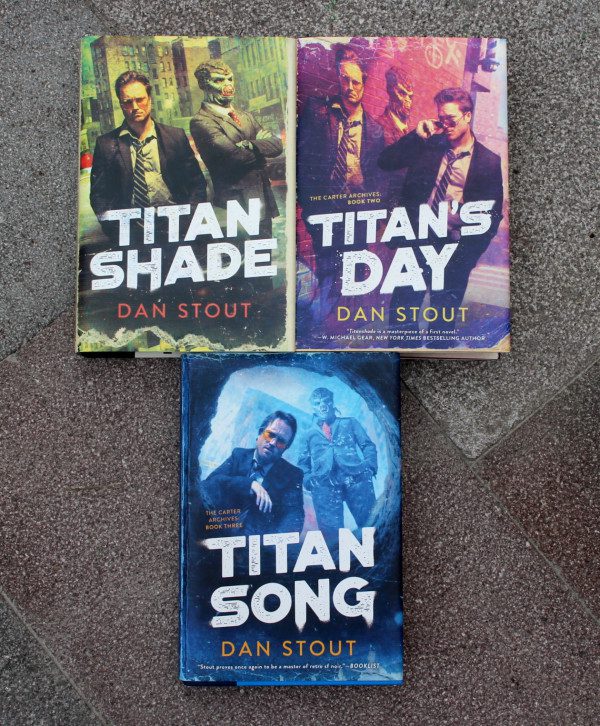
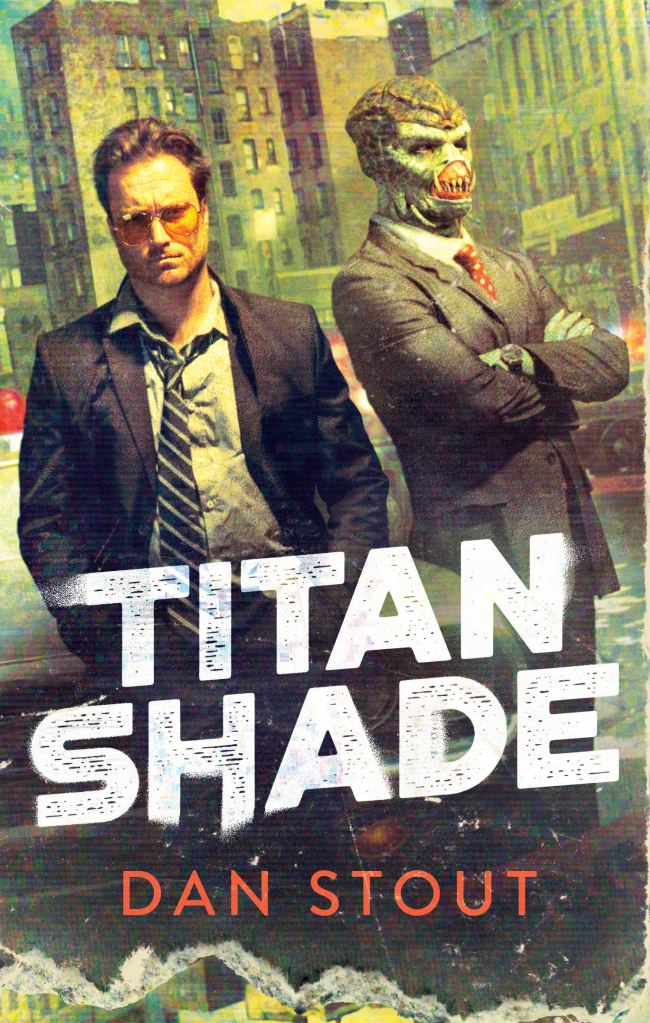
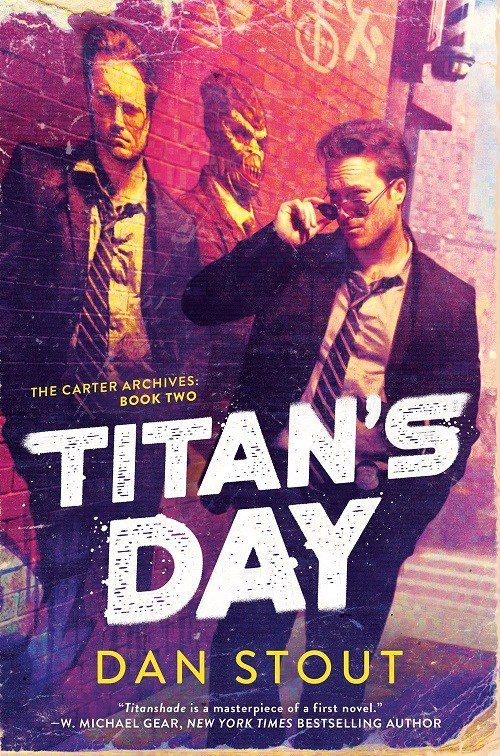
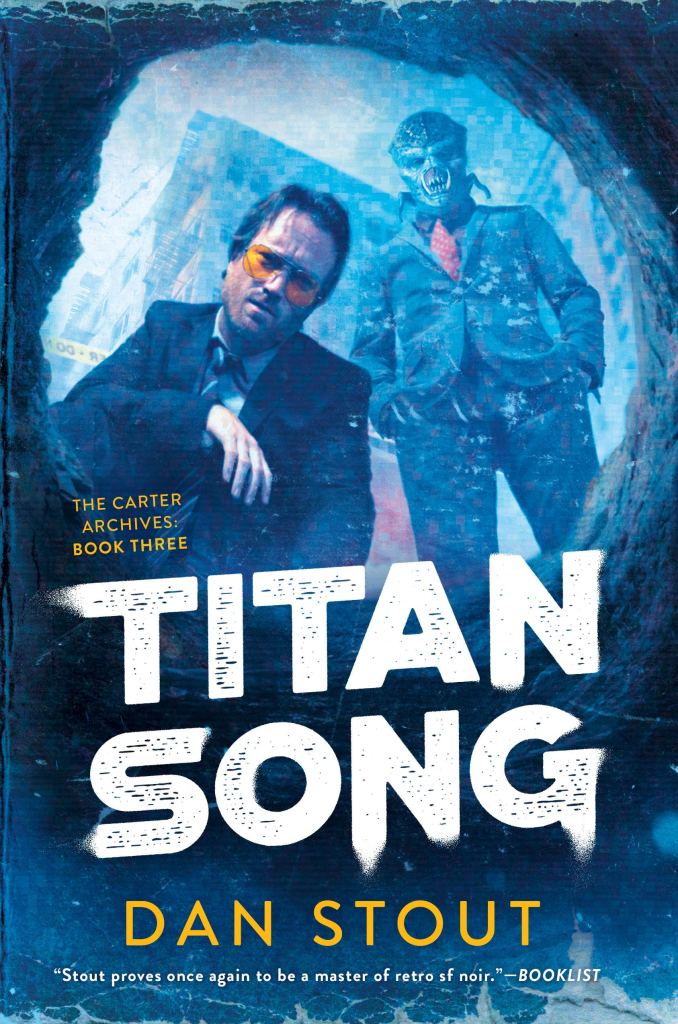
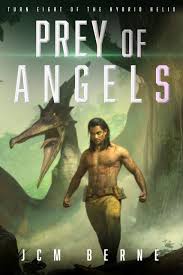
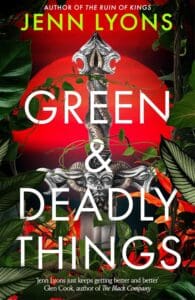
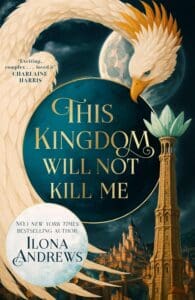
I LOVED Titanshade, and am really disappointed in myself that I haven’t continued the series. Also, Dan is one of the kindest humans on the planet!